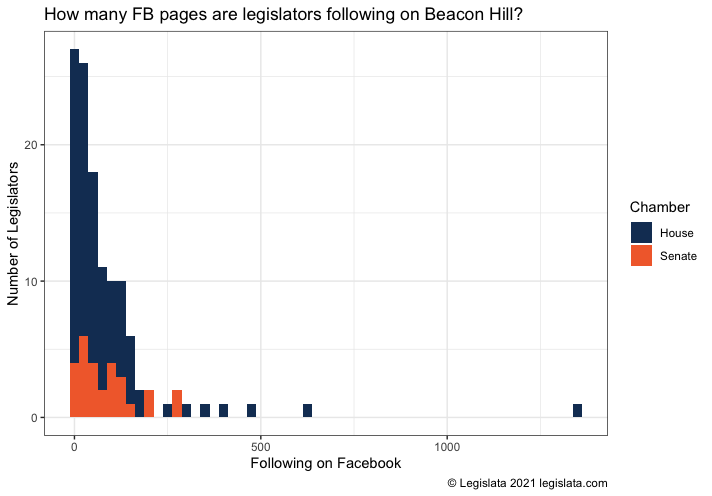Who does the Massachusetts State Legislature follow on Facebook?
Facebook has become a ubiquitous communications platform for many elected officials - perhaps the top way they get their message out. In the Massachusetts State House, all 200 senators and representatives have a Facebook page but only 184 have a Twitter account. Meanwhile, only 78 have websites that we classify as containing regular updates to constituents about issues and activities.
That in itself is interesting. Facebook is the platform that has attracted criticism from both the left and the right, but has become a de facto communications tool for elected officials. The Facebook activity of elected officials therefore deserves to be the subject of academic study and, indeed, has been. The Pew Research Center’s analysis of congressional activity can be found here and here is an article examining German political discourse from 2015.
However, most study of Facebook activity is on politicians’ posts and the reactions to them. There is another aspect of Facebook that is sitting there unexamined: politicians following others.
Facebook vs Twitter
We have previously looked into who politicians’ accounts follow on Twitter (Massachusetts state legislature here, Boston here, and Arizona here). You can also follow other accounts on Facebook. It’s a different connection than a friending between two individual accounts. It’s a follow of a public page whose posts will then appear in your news feed – much more like following an account on Twitter.
Since it’s similar to Twitter, we decided to conduct a similar analysis. We went through the 200 pages of the members of the Massachusetts State House, saw if they followed anyone, copied the names of the pages they did follow, and then analyzed the 10,666 follower-followed connections.
Who follows more?
Facebook pages see far fewer follows than Twitter accounts. Only 121 out of 200 pages followed others and the median page that did followed 46 other pages. This is a big difference from Twitter, where the median legislator’s account followed 740 other accounts.
There was not a drastic difference between the parties. The median Democrat followed 46 pages and the median Republican followed 34.
The chambers did show some differences. The median Representative’s account followed 42 pages. The median Senator’s account followed 65.
Who receives the follows?
So if elected officials follow a select number of pages, who gets to be in that relatively small number?
To a large extent, it’s each other. The most followed page is Rep. Lori Ehrlich and all of the top ten are Massachusetts elected officials (and the former Speaker’s page).
Most followed accounts on Facebook
This is a contrast to Twitter, where the State House News Service was the top account and many news organizations were followed by a majority of the House and Senate. On Facebook, the SHNS is followed by only 3% of the accounts, compared to 92% on Twitter. The Boston Globe is followed by 10% (69% on Twitter). And GBH is followed by 2% (56% on Twitter).
It also seems that national figures aren’t followed much. Barack Obama is followed by only 3% on Facebook but 64% on Twitter. Rep. Ocasio-Cortez is followed by less than 1% on Facebook and 32% on Twitter. President Joe Biden is followed by 2% on Facebook and 52% on Twitter.
Instead, the top accounts followed on Facebook include (besides elected officials) the Massachusetts Emergency Management Agency, the Massachusetts Caucus of Women Legislators, and the Professional Fire Fighters of Massachusetts.
What does this all mean?
It seems clear that elected officials don’t use Facebook for their news consumption, since news sites are followed at such low numbers. Twitter appears to be more used for that. They instead use it more to broadcast their own thoughts and connect with constituents.
Following others on Facebook appears to be either a sign of professional courtesy, support, or desire to keep up to date with colleagues and those that they work with closely at the state and local level.
However, that could mean that this makes Facebook follows more valuable as a source of intelligence about an elected official. Since Facebook follows are rarer than a Twitter follow, and tend to be with those they work with, then a follow could indicate a decent working relationship. All of this should be taken with the caveats that there is a wide range between individual accounts. The significance of a follow from Senator X to Representative Y depends on whether Senator X follows 10 or 1,000 pages.
But this does present one way to better understand an elected official or candidate. Whether they are a colleague, someone you’re about to have a meeting with, or someone you’re reporting on, seeing who their page follows could be a way to get a sense of where they stand. If they have followed only a few other elected officials, and you have a good relationship with one of them, that’s something to mention. If they follow only a certain ideological set of legislators, that could be an indication of their policy sympathies. Republican pages are followed more by Republicans and Democrats by Democrats, so there is evidence that there are political reasons for the following stats.
Ultimately, every time an elected official’s page chooses to follow another, it’s a little piece of information being made available, and it’s an opportunity for others to learn something.
Keeping up with Beacon Hill on Legislata
We’re piloting a feature that lets people more easily follow and share what’s happening on Beacon Hill. It includes daily updates on changes to legislation, new events at the State House, and a roundup of legislators’ tweets. If you’ve read this far, it might be of interest to you. Click below to join our waiting list for the feature.


